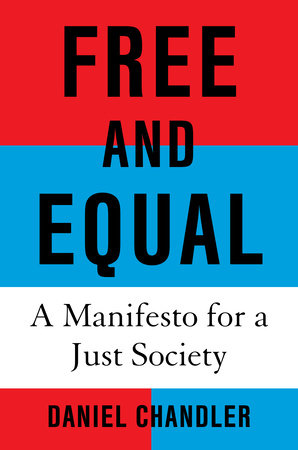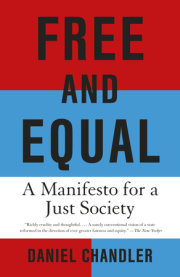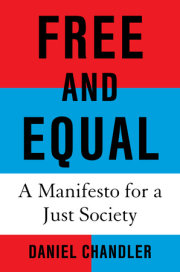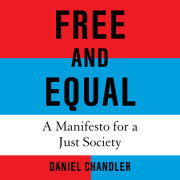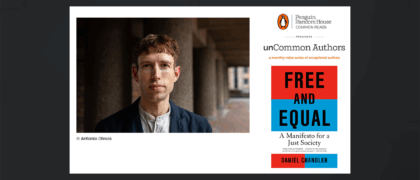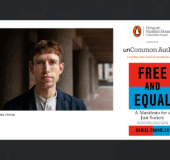Part ONE
1
What’s Fair?
Justice is the first virtue of social institutions, as truth is of systems of thought. A theory however elegant and economical must be rejected or revised if it is untrue; likewise laws and institutions no matter how efficient and well-arranged must be reformed or abolished if they are unjust.
John Rawls, A Theory of Justice1
We tend to take for granted the way in which society is organized: political and economic institutions change slowly, and they can take on an air of naturalness or inevitability. But we must not be fooled by this illusion. There is no natural or neutral way to organize society—our democracy and economy are the products of human choices, and it is within our power to change them. Together, these structures comprise a social system which, in Rawls’s words, “is not an unchangeable order beyond human control but a pattern of human action.”2
Our societies require a range of institutions in order to function: they require political structures, such as parliaments and elections, which we can use to make collective decisions; a legal system, including courts and a judiciary, which can enforce these decisions; economic institutions, such as markets and property rights, which facilitate production and trade; and social structures, such as the family, which help to sustain our society and pass on our shared culture from one generation to the next. These institutions—what Rawls referred to as the “basic structure” of society—influence our lives in profound and unavoidable ways. They determine our rights and obligations as citizens, and the opportunities open to us through education and work; and, through their impact on culture, they even shape our values, dreams and aspirations, and hence the kinds of people we are and want to be.
In a democracy, we share a collective moral responsibility for how we design the basic structure of our society, and the impact it has on each of our lives. For Rawls, this is what justice is all about, and he devoted his life to identifying a clear set of principles that could guide us in designing these institutions. His starting point was the idea that society should be fair—this is why he called his theory “justice as fairness.” His life’s work was, in effect, an attempt to unpack this fundamental idea; to think through what it would mean to live together on terms that everyone could accept as fair. As we saw in the Introduction, Rawls proposed a powerful and intuitive thought experiment, which he called the “original position,” in order to answer this question. If we want to know what a fair society would look like, he argued, we should ask ourselves how we would choose to organize it if we didn’t know what our individual circumstances would be, as if behind a “veil of ignorance.”
Rawls argued that we would select two overarching principles of justice, relating to freedom and equality respectively, alongside a further principle of intergenerational justice and sustainability. As we shall see over the course of this book, these principles provide a remarkably clear and powerful framework for thinking our way through many of the most challenging issues facing our societies today, from questions about free speech and the role of money in politics, to those concerning poverty, inequality and the climate and ecological crisis; and in the second part of this book, we will adopt these principles as the basis for developing a practical agenda to change our society for the better.
But before we take up these real-life challenges, we need to look in a bit more detail at the principles themselves. Although just over 100 words in total, they are the essence of Rawls’s theory, and contain within them an enormously rich set of ideas.
Rawls’s Two Principles of Justice
First principle: Each person has an equal claim to a fully adequate scheme of equal basic rights and liberties, which scheme is compatible with the same scheme for all; and in this scheme the equal political liberties, and only those liberties, are to be guaranteed their fair value.
Second principle: Social and economic inequalities are to satisfy two conditions: first, they are to be attached to positions and offices open to all under conditions of fair equality of opportunity; and second, they are to be to the greatest benefit of the least advantaged members of society, consistent with the just savings principle.3
At first sight, the principles are rather dense: it’s not obvious what they mean, or why they are so distinctive, and the aim of this chapter is to explain this. But one thing is readily apparent: they are designed to answer the specifically political question of how we should organize our most important social institutions, rather than any wider moral questions about what makes life worthwhile, or what we owe our friends and family. This focus on social justice—the justice of institutions, as opposed to the justice of individual actions—set Rawls apart from many thinkers in the liberal tradition, so much so that one prominent philosopher referred to this aspect of his theory as “the coming of age of liberal political philosophy.”4
Rawls also distinguished between “domestic justice”—which is the focus of his theory—and both “local” and “global justice.”5 While domestic justice, and hence Rawls’s principles, are concerned with how we should organize the basic structure of society—the core institutions without which it couldn’t function—they are not meant to tell us how we should organize the internal life of the various associations that operate within the basic structure, such as families, churches or sports teams.6 These are matters of “local justice.” Of course, Rawls’s principles set some limits on how these associations can operate—churches cannot punish heretics beyond expelling them, and parents cannot deprive their children of medical help or a decent education. But within these broad limits, private associations should be free to organize themselves as they see fit.
Neither are his principles designed to answer questions about “global justice”—justice between, rather than within, countries—such as what obligations rich countries have to poorer ones, or whether one country can intervene in another to protect human rights. In the context of enormous global inequalities, climate change and even war, these are undoubtedly pressing issues, with hugely important practical implications, from how we structure the global trading system to how much money we should spend on international aid and how we should share the costs of phasing out fossil fuels and adapting to a warmer planet. But the relationship between countries differs significantly from the relationship between citizens within a country, and working out the details of these obligations calls for a different set of principles.7 Following Rawls, we will focus on domestic justice—on how we should design the basic institutions of an individual country—since it is disagreement about this question which underpins the crisis of faith in liberal democracy today, and which must be the starting point for the political and social renewal we so urgently need.8
FREEDOM
The foundation of any liberal democracy is a commitment to protecting certain fundamental rights and freedoms. This idea is accepted today across the political spectrum: it is the driving force behind the modern human rights movement, and many countries enshrine a set of fundamental rights in a written constitution. And yet, although there is general agreement that everyone is entitled to certain basic freedoms, there is disagreement about which ones. Should gay people have the right to marry? Should women have the right to an abortion? And what should we do when our most basic freedoms come into conflict with one another? Should, for example, freedom of expression give religious believers the right to refuse to serve gay customers?
Rawls’s first principle—the basic liberties principle—can help us answer these difficult questions. Let’s start by looking at which freedoms Rawls considered to be truly “basic liberties” (in this discussion, I will use “liberties,” “rights” and “freedoms” interchangeably). We can group them into three loose categories: personal, political and procedural.9 The personal liberties include freedom of conscience, thought and expression, freedom of association, and the rights that are needed to ensure our individual freedom and bodily integrity—including freedom from violence and coercion, freedom of movement, free choice of occupation, the right to a private family life, freedom of choice in questions of sexuality and reproduction, and the right to own personal property like clothing and housing. These freedoms create a protected space in which we can think freely and pursue our own idea of how we want to live our lives—what religion we want to follow, if any; whom we want to be in a relationship with, and whether we want to start a family; what kind of work we want to do, and how we spend our time outside work. They reflect a deep commitment to the liberal ideal of a society in which people with different moral and religious values can live side by side, and where we agree not to use the power of the state to impose our beliefs on anyone else. At a time of rising intolerance and growing “culture wars,” this commitment is more important than ever.
Next come the political liberties, which encompass all the rights and freedoms that underpin the democratic process. These include not just the right to vote and to stand for office, but also wide-ranging freedoms of political speech and association, including the right to scrutinize and criticize the government and to form political parties and campaign groups. Crucially, Rawls’s first principle does not seek only to guarantee our formal equal political rights but also to create a political system in which we have substantively equal opportunities to exercise those rights and to influence collective decision-making, irrespective of wealth, race, gender and so on. This is what Rawls meant when he said that the equal political liberties “are to be guaranteed their fair value.”10 In most advanced democracies, rich individuals and powerful corporations have come to exert an outsized influence over the democratic process, in large part through making donations to political parties and their ownership of the news media. This tendency for democracy to degenerate into plutocracy—government by the wealthy—concerned Rawls deeply, and he argued that the failure to address this was one of the most serious problems with our societies.11 As we shall see in Chapter 5, achieving political equality in this sense will require far-reaching reforms to democracy as we know it, starting with an entirely new system for funding political parties and the news media.
The personal and political liberties are the core substantive freedoms protected by the basic liberties principle, and they correspond to the liberal and democratic aspects of the familiar term “liberal democracy.” Alongside them are what we might call “procedural liberties,” or the rights and liberties associated with the rule of law. At the most basic level, “the rule of law” means that the state should act in accordance only with laws that have been approved through a legitimate political process. Moreover, everyone should be subject to the same laws, which should be administered in a regular and impartial manner. In practical terms, the procedural liberties underpin vital protections like freedom from arbitrary arrest and the right to a fair trial. These freedoms are a precondition for enjoying all the other basic liberties: after all, without the rule of law, democracy would be meaningless since the state could act with impunity, and none of our personal liberties would be secure.
But what exactly does it mean for a liberty to be “basic”? Basic liberties, as Rawls conceived them, are both “fundamental” and “inalienable.” They are “fundamental” in the sense that a basic liberty can be limited only in order to protect another basic liberty. To take a relatively uncontroversial example, we can limit free speech where this is necessary to prevent violence, and hence protect our basic right to physical safety and bodily integrity. But it would be wrong for the state to limit our basic freedoms simply in order to satisfy the moral or religious views of the majority. So, for example, it would be wrong to ban gay relationships simply because some people—or even most people—think homosexuality is a sin. Similarly, the state cannot limit the freedom of a religious minority simply because this would satisfy the beliefs of the majority. No matter how much we might disagree with our fellow citizens about personal morality and religion, the basic liberties principle calls on us to respect each person’s freedom to live according to their own beliefs. The only limit on this freedom is the freedom of others to do the same.
The protection of basic liberties covered by Rawls’s first principle also takes strict precedence over the pursuit of economic justice, which is the focus of his second principle (in this sense, the order in which he listed his principles really matters).12 So, for example, the state cannot take children away from their parents, even if doing so would promote equality of opportunity; and neither can it bypass the democratic process, or disenfranchise particular groups of voters, even if doing so would lead to faster economic growth and make it easier to address poverty. In other words, we can immediately reject the kinds of arguments that authoritarian communists have sometimes made to justify the denial of basic personal and political freedoms, and which continue to be made in present-day China and elsewhere. And, of course, it isn’t only those on the hard left who are or have been willing to subordinate basic freedoms to economics—the same is true of authoritarian neoliberals such as General Augusto Pinochet, who oversaw a brutal free-market regime in Chile in the 1970s and 1980s.
The basic liberties are also “inalienable,” meaning we cannot voluntarily give up, or “alienate” ourselves from, them.13 In other words, in a society organized according to this principle we would not be able to sell ourselves into slavery or sell our right to vote, even if we wanted to. For Rawls, the role of the state is not, as some libertarians believe, simply to enforce voluntary contracts; rather, it is to maintain the conditions that are the basis for our freedom and equality as citizens, and to permit slavery would go against this most basic commitment.
Rawls’s account of which liberties are “basic” has a number of distinctive features that distinguish his theory from other liberal thinkers, with important practical implications.
First, as we have seen, he argued that both personal and political—or liberal and democratic—freedoms are “basic” and so deserve special protection. We often talk about these freedoms as if they are inseparable—hence the term “liberal democracy.” But this hasn’t always been the case, and in giving both types of freedom equal weight Rawls sought to transcend an important philosophical divide.14 On one side of this divide is a school of thought often associated with the eighteenth-century philosopher Jean-Jacques Rousseau, but with roots going back to classical Athens. It argues that political or democratic freedoms, or what the philosopher Benjamin Constant referred to in an influential essay in 1819 as the “liberties of the ancients,” are the most important.
Copyright © 2024 by Daniel Chandler. All rights reserved. No part of this excerpt may be reproduced or reprinted without permission in writing from the publisher.

